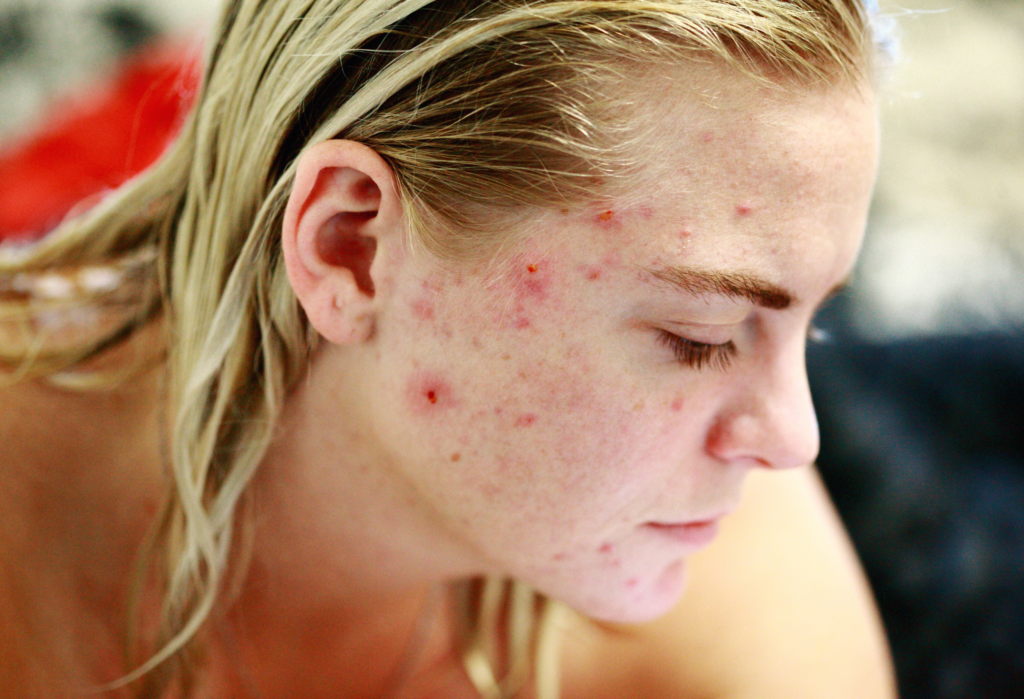
Adult acne is a frustrating and persistent skin condition that affects millions. Despite countless over-the-counter products and prescription medications, many individuals still struggle to find relief. However, there might be a surprising and unconventional approach to tackling this stubborn skin issue: a closer look at your diet.
Understanding Adult Acne
Before delving into the surprising link between diet and acne, it’s essential to understand the complexities of adult acne. Unlike teenage acne, which is primarily hormone-driven, adult acne has multiple contributing factors.
Common Causes of Adult Acne:
- Hormonal Imbalances: While more prevalent in teenagers, hormonal fluctuations can still trigger acne in adults, especially women.
- Stress: Chronic stress can elevate cortisol levels, leading to inflammation and acne outbreaks.
- Medications: Certain drugs, including corticosteroids and lithium, can cause acne as a side effect.
- Skincare Products: Using comedogenic products can clog pores and worsen acne.
- Underlying Medical Conditions: Conditions like polycystic ovary syndrome (PCOS) can contribute to acne.
The Surprising Link Between Diet and Acne
For years, the connection between diet and acne has been debated. While research is ongoing, a growing body of evidence suggests that dietary choices can significantly impact skin health.
Acne-Inducing Foods:
- High Glycemic Index (GI) Foods: These foods cause rapid spikes in blood sugar, triggering inflammation. Examples include white bread, sugary drinks, and potatoes.
- Dairy Products: Some studies link dairy consumption to acne, particularly in individuals sensitive to milk proteins.
- Processed Foods: Packed with unhealthy fats, sodium, and additives, processed foods contribute to overall skin health decline.
- Refined Sugars: Excessive sugar intake can lead to insulin resistance and inflammation, worsening acne.
Acne-Fighting Foods:
- Fruits and Vegetables: Rich in antioxidants and vitamins, they combat inflammation and protect skin.
- Omega-3 Fatty Acids: Found in fatty fish, flaxseeds, and walnuts, they have anti-inflammatory properties.
- Zinc: Essential for skin repair, zinc-rich foods include oysters, pumpkin seeds, and lentils.
- Vitamin A: Found in carrots, sweet potatoes, and spinach, it promotes skin cell turnover and regulates sebum production.
The “Weird Trick”: The Low Glycemic Index Diet
One dietary approach gaining attention for acne management is the low glycemic index (GI) diet. By focusing on foods that cause gradual blood sugar increases, you may help reduce inflammation and acne flare-ups.
Key Principles of a Low GI Diet:
- Prioritize Whole Grains: Opt for brown rice, quinoa, and whole-wheat bread.
- Choose Lean Proteins: Incorporate chicken, fish, beans, and tofu.
- Load Up on Fruits and Vegetables: Aim for a variety of colorful produce.
- Limit Sugary Drinks and Processed Foods: Focus on water, unsweetened tea, and whole foods.
Creating a Personalized Acne-Fighting Diet
While the low GI diet can be a helpful starting point, finding a diet that works best for you is crucial.
- Keep a Food Diary: Track your food intake and skin changes to identify potential triggers.
- Experiment with Elimination Diets: Temporarily eliminate suspected acne-inducing foods to see if your skin improves.
- Consult a Registered Dietitian: A professional can create a personalized meal plan.
Beyond Diet: Additional Tips for Clear Skin
While diet is essential, other factors contribute to acne-free skin.
Skincare Routine:
- Gentle Cleansing: Use a mild, non-comedogenic cleanser twice daily.
- Exfoliation: Regularly exfoliate to remove dead skin cells.
- Moisturization: Hydrate your skin to maintain its natural barrier.
- Spot Treatment: Apply benzoyl peroxide or salicylic acid to individual pimples.
Lifestyle Factors:
- Manage Stress: Practice relaxation techniques like meditation or yoga.
- Prioritize Sleep: Adequate sleep is crucial for skin repair.
- Regular Exercise: Physical activity reduces stress and promotes overall well-being.
Recommended Products:
- CeraVe Foaming Facial Cleanser: A gentle cleanser suitable for acne-prone skin.
- The Ordinary Niacinamide 10% + Zinc 1%: Helps regulate sebum production and improve skin texture.
When to Seek Professional Help
If your acne is severe, persistent, or causing significant distress, consult a dermatologist. They can provide targeted treatments and address underlying medical conditions.
Remember: Clear skin is a journey, not a destination. Be patient, consistent, and kind to yourself. With the right approach, you can achieve a clear and confident complexion.
Disclaimer: This information is intended for general knowledge and informational purposes only, and does not constitute medical advice. Consult with a qualified healthcare professional for any medical conditions.
